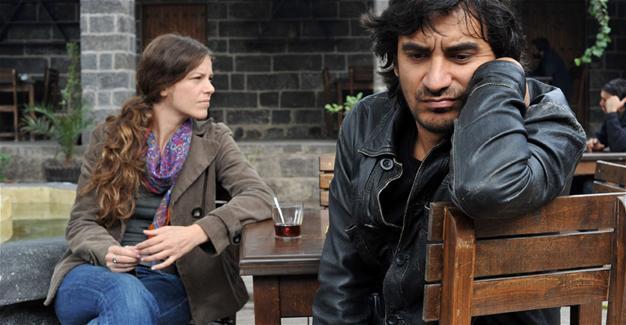‘Can music make people come together?’ Film asks
Emrah Güler

“Music makes the people come together. Music mix the bourgeoisie and the rebel.” These lines from Madonna’s 2000 pop anthem “Music” can very well be appropriated to this week’s new release “Bana Git De” (Tell Me To Go), feature drama directed by Handan Öztürk, as well as many other feature films in the last decade that use music as a connector in an ethnically diverse country that is becoming polarized and disconnected more each passing day.
Dozens of different ethnic identities, coupled with the rich history of Anatolia that has served many civilizations and many people, make Turkey the host of a diversity of music and a plethora of instruments. Sadly, the multiplicity is hardly evident in today’s popular music that rarely uses ethnic melodies, if they do at all. Some Turkish filmmakers have been using music as a strong metaphor for change and loss. Öztürk is one of them.
Music and musicians take center stage in “Bana Git De,” with two leading characters taking the road in different directions, with music leading them and giving them some needed ammunition on their journeys. Ali (Tayanç Ayaydın) is a guitarist from Istanbul, he is an aimless wanderer who is tired of repetition and has lost inspiration from music, something that once gave him a sense of direction.
Ali finds that the only way to find himself or lose himself to become fresh again, is to leave Istanbul and go back home. As he begins his journey from west to east, Leyal (Atiye Yılmaz) begins a journey from the east to the west. A singer from a small city in eastern Turkey, Leyal has ambitions to sing to bigger crowds, and be inspired by many others like her in the big city.
Ali and Leyal’s paths intersect as they form a brief but strong connection, only to lose one another in their journey to opposite directions. Öztürk occasionally weaves her story like a potpourri of music videos, music that is uniquely local and reflective of Anatolia’s diversity. Music and musicians become central to the film, the refreshing soundtrack transforms the film almost into an anthology of music of these lands.
Collecting elegies, lossesThe two names behind the inspiring soundtrack are the cousins Mehmet Erdem and Özgür Akgül, two crafted musicians who both play many traditional instruments like the oud, cümbüş, bouzouki and bağlama. They both have experience in putting their names on successful soundtracks such as “Polis” (Police), and the popular “Vizontele” films.
“Bana Git De” reminds one of another recent Turkish film, award-winner Özcan Alper’s “Gelecek Uzun Sürer” (Future Lasts Forever) of 2011. In the film, a young woman named Sumru (Gaye Gürsel), travels from Istanbul to the southeastern province of Diyarbakır to research on Anatolian elegies for her doctoral thesis. Her research takes the form of talking to women who have lost their beloved ones to the Turkish-Kurdish conflict, which has claimed thousands of lives in the last three decades.
Sumru’s journey becomes a harrowing one as she compiles losses along with elegies, facing her own loss, the broken relationship she had left behind in Istanbul. In Diyarbakır, she makes an unlikely friendship with Ahmet (Durukan Ordu), a pirate DVD seller, a cinephile and someone who has first-hand tales to tell about the war in the region.
Partly a road movie, partly laments a lost love, and partly a political drama, the movie’s power to move mostly comes from its heartfelt look at the consequences of war on individual lives, and mostly on women, through dissecting elegies, which is an integral part of the grief culture in traditional Anatolia. As Sumru begins looking at the otherwise woeful elegies under a different light, so do the audience, by connecting elegies with human stories.
Both “Bana Git De” and “Gelecek Uzun Sürer” are stories of lives that have been stuck in a purgatory of an increasingly polarized west and east, and urban and rural Turkey. Both films put music at the center of their stories, using it not only as a metaphor of change and loss, but bringing forth music that is in danger of being sent to oblivion. And both films offer a chance to listen to music that is hard to find in music markets.
 “Music makes the people come together. Music mix the bourgeoisie and the rebel.” These lines from Madonna’s 2000 pop anthem “Music” can very well be appropriated to this week’s new release “Bana Git De” (Tell Me To Go), feature drama directed by Handan Öztürk, as well as many other feature films in the last decade that use music as a connector in an ethnically diverse country that is becoming polarized and disconnected more each passing day.
“Music makes the people come together. Music mix the bourgeoisie and the rebel.” These lines from Madonna’s 2000 pop anthem “Music” can very well be appropriated to this week’s new release “Bana Git De” (Tell Me To Go), feature drama directed by Handan Öztürk, as well as many other feature films in the last decade that use music as a connector in an ethnically diverse country that is becoming polarized and disconnected more each passing day.